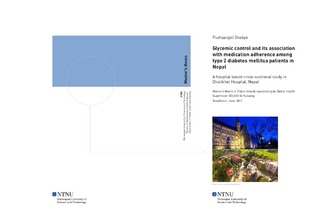| dc.description.abstract | Background
Diabetes is a medical condition characterized by high sugar level in blood caused due to impaired insulin production or function. It is steadily increasing everywhere around the world resulting in 1.5 million deaths due to diabetes in 2012 as per WHO report in 2016. The high mortality rate is due to a number of life-threatening health problems caused by uncontrolled glycemia. Medication adherence, among other factors such as diet control, exercise and life-style modification, is one of the necessary pre-conditions to have good glycemic control and therefore, to reduce burden of diabetes.
Objectives
The primary objectives of this study were (i) to determine the status of glycemic control, (ii) to determine the status of medication adherence for diabetes medicines and (iii) to identify the association between glycemic control and medication adherence. Secondary objectives were to identify the associated factors of medication adherence on diabetes medicines and to identify the association between attendance of diabetes counseling and medication adherence for both formally educated and not formally educated type 2 diabetes mellitus (DM) patients.
Methods
A hospital based cross sectional study was conducted at laboratory department of Dhulikhel Hospital among the patients visiting for their regular Fasting Blood Sugar (FBS) test from September to December 2016. Inclusion criteria were (i) type 2 DM patients (ii) under diabetes medication from at least past three months (iii) aged ≥18 years. Patients with FBS < 7 mmol/litre and glycated haemoglobin (HbA1c) < 7% were categorized as good glycemic control. The medication adherence was measured with Nepali version of 8 item Morisky Medication Adherence Scale (MMAS-8) (© 2007 Donald E. Morisky). Multivariate linear regression was applied to assess the association of glycemic control (FBS and HbA1c) and medication adherence and multivariate logistic regression to identify the associated factors of medication adherence of diabetes medicines. Both of them were adjusted for sociodemographic and clinical characteristics.
Results
A total of 343 eligible cases were recruited for the study. Mean age of respondents was 55.8 years, 54.2% were male and 49% belonged to Newar ethnicity. Average FBS was 147.9 (SD: 57.3) mg/dl [8.2 (SD: 3.2) mmol/L] and average HbA1c among 198 participants was 7.8 (SD: 1.8) %. Only 42% had good FBS control while 37.4% had good HbA1c control despite of having high mean MMAS-8 (© 2007 Donald E. Morisky) score of 7.4 (SD: 1) with 60.9% high adherence (score =8), 31.8% moderate adherence (score ≥6 and <8) and 7.3% low adherence (score <6). There was statistically significant association between FBS and medication adherence [β: -14.32 (95% CI: -28.47,-0.16), p=0.047] but no such association between HbA1c and medication adherence. High medication adherence was found to be significantly associated with formal education [AOR: 2.43 (95%CI: 1.34, 4.39), p=0.003] and attendance of diabetes counseling [AOR: 1.76 (95% CI: 1.02, 3.04), p=0.04]. There was no significant interaction between education and attendance of diabetes counseling [95% CI: 0.49, 4.25, p=0.51] in relation to medication adherence.
Conclusion
The glycemic control among the sample representing Nepalese type 2 DM population was not good though the proportion of high medication adherence was high. There was statistically significant association of glycemia (FBS) with high medication adherence. In addition, high medication adherence was statistically significant with formal education and attendance of diabetes counseling. For all the patients with formal or no formal education, medication adherence had significant association with attendance of diabetes counseling. Hence, we encourage that higher number of type 2 DM patients should take part in counseling program and constant training should be given to health care professionals to conduct diabetes counseling. | nb_NO |
